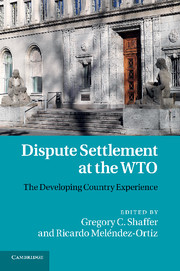10 - Conclusion
Published online by Cambridge University Press: 07 September 2011
Summary
The Dispute Settlement Understanding (DSU) has significantly altered the way in which international trade disputes are processed and resolved. In general terms, the DSU has substituted a more ‘legalised’ system of dispute settlement, with new procedural requirements, over the more ‘political’ system in place under the GATT. In doing so, it has created both opportunities and challenges for developing countries. On the one hand, it has helped to level the playing field between weaker and stronger WTO Members, while, on the other hand, it has raised the bar in terms of the resources (both human and financial) required to use the system effectively. The DSU can therefore directly benefit developing countries, but only if they develop the means to access and deploy it.
Some developing countries have been extremely proactive in using the dispute settlement system and their successes have been touted; many developing countries have had moderate (or at least some) exposure to it; yet the majority of poorer and smaller WTO Members have not used it at all. The nine case studies in this volume present a broad spectrum of developing country use by, and adaptation to, the DSU, ranging from the most frequent developing country users of the DSU (Brazil and India), to relatively more frequent users (Argentina, Thailand, and, though so far especially as a respondent and third party, China), to countries that have never filed claims but have been respondents (Egypt and South Africa), to the first least developed country to have filed a complaint (Bangladesh), to a country that has neither been a complainant nor respondent (Kenya).
- Type
- Chapter
- Information
- Dispute Settlement at the WTOThe Developing Country Experience, pp. 342 - 348Publisher: Cambridge University PressPrint publication year: 2010
References
- 3
- Cited by



